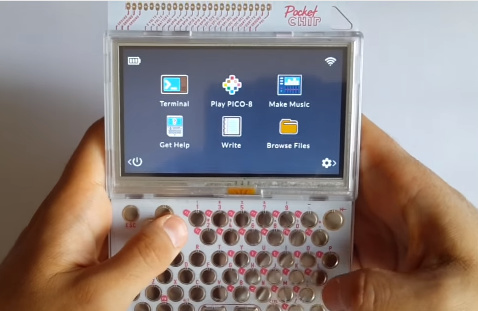Another contender: runs Sunvox natively!
PocketCHIP is the world’s first $9 computer

@ 4:52...
If we all work together and learn c++ I’m sure we could easily program a pretty powerful little daw
PocketCHIP is $69, the CHIP itself is $9.
https://getchip.com/pages/chip
https://getchip.com/pages/pocketchip
But I do kind of want one.
Somewhat relevant
Im buying one. just because its cheap.
I use renoise and was planning to buy harrisons mixbus for mixdowns. (also works on linux)
I need a new pc anyways. this could actually work. I currently use mac but…
this stuff is wonderful
Awesome! It’s good to see ppl actually try it out instead of just reposting shit like me. Let us know how it goes - be interested in any particular setbacks and advantages as you come across 'em…

Going back over this today… HOLY SHIT is this gonna be a gamechanger.
https://www.raspberrypi.org/forums/viewtopic.php?t=172327&p=1106205
@mks - you start your Pi project yet?
Yeah, but it has taken a twist.
I put it on my LAN and I started to learn Perl on it this weekend. I also installed Apache2 on it and am using it as a web server. I am going to practice HTML/CSS, Perl and Python on it. I am just SSH’ing into it at the moment.
But, Sonic-Pi is already installed on it with Raspbian, which is what I’m using right now. When I hook some speakers up to that thing, I am going to mess around with Sonic-Pi.
Think it’s getting to the point where the only real issue will be D/A converters. Everything else is viable if not fully dialed in.
Sound card for the Raspberry Pi with inbuilt microphone : http://www.audioinjector.net
Audio Inector Octo multitrack recording and Surround GPIO sound card live now on kickstarter : http://kck.st/2iU3UcH
I am thinking of buying another Pi and building a speakerbot.
Depending on how that Sonic-Pi goes, I might just record sounds off of my MS-20mini and record that into that Tracktion software. I will just have the speakerbot roll around making blips and bleeps interspersed with the occasional Chinese cuss word while playing King Tubby, Prince Jammy and Scientist.
You’re halfway to an ideal life partner right there breh… 
This can only help:
The Compute Module for embedded computing got its first upgrade since 2014
The Raspberry Pi Compute Module is in for a big upgrade, with the same 64-bit processor used in the recently released Raspberry Pi 3. Intended for industrial applications, the Compute Module, first released in April 2014 with the same CPU as the first-generation Pi, will now have 1 GB of RAM and a Broadcom BCM2837 processor that can run at up to 1.2 GHz.
According to the Raspberry Pi Foundation, this means that the upgrade provides twice the RAM and 10 times the CPU performance of the original Compute Module. The company acknowledged that some of its users had an issue with the fixed 4 GB of eMMC flash storage on the original module, so in order to address this, it launched two variants of Compute Module 3: one with 4-GB eMMC on-board, and a ‘Lite’ model that requires the user to add their own SD card socket or eMMC flash. Although this is the second major version of the Compute Module, it’s being called the “Compute Module 3” to match the last flagship Pi’s version number.
And while the flagship Raspberry Pi can serve as a general-purpose computer and can power many hobbyist projects, the Compute Module’s stripped-down form factor makes it more suitable for embedded computing, as it fits into a standard SODIMM connector. The latest version is being used by NEC in displays for digital signs, streaming, and presentations. The new Compute Module can run Windows IoT Core and supports Linux, and also supports more flexible storage options than the original.
Because it’s tiny, the core module can fit into other hardware. For development purposes, there’s a separate I/O board with GPIO, USB, MicroUSB, CSI, and DSI ports for camera and display boards, HDMI, and MicroSD.
Fortunately in most cases, the new Compute Module can replace the original in embedded projects because the form factor is nearly identical. According to the Raspberry Pi Foundation’s announcement, "with a few caveats, the CM3 can be used a drop-in replacement for the CM1 because they are pin-compatible; the CM3 is 1 mm taller, however, while the CPU can pull a lot more current from the VBAT power supply line and will generate far more heat under heavy load.”
The company has priced the Compute Module 3 at $30, while the Lite version has been priced slightly lower at $25. According to the Foundation, an updated IO breakout board (CMIO3) has also been launched, which will accept all three models. Currently, the modules can be purchased via distributors such as element14 and RS Components. Although availability seems limited, the I/O board is being sold separately by RS Components for about $116.
Barely meets the <$50 req, but runs on Raspberry Pi…
Seems like some people start to see the potential in Linux as a sound making platform. I’d add Ardour DAW to the list of the software
But Tracktion on Pi seems to be a Cosmos to me. Can’t wait to see all of us leave or laptops and notebooks and midi towers for the favour of Raspberry or other <$50 hardware for music making just because they are cheap though ^.^
Pretty cool sounds.